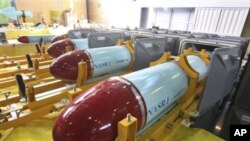Iran recently announced that a new naval missile had been placed in operation. While Iran says this weapon is a major advance, and claims it even has the ability to evade destruction, one U.S. security and weapons analyst says the reality is that Iran cannot afford to create conflict in the Persian Gulf, especially conflict that could close the Straits of Hormuz to oil tankers and other shipping.
The new naval weapon, called the NASR, is just over 3 meters long, and can be launched both by boats as well as mobile launchers mounted on trucks. John Pike, director of the Washington-based analysis firm GlobalSecurity.Org, says the missiles are made in China.
"They are [now] manufacturing them locally [in Iran], and apparently they are making their own homegrown versions of them as well,” he said.
The NASR naval missile is short ranged – analysts say from 5 to under 30 kilometers.
Asked by VOA about Iran's purpose for the NASR missiles, Pike says there are several uses Iran could employ.
"One of them would be to try to scare off the United States Marine Corps if the Marines wanted to land somewhere [on the coast of Iran]. The other is to try to stop oil shipments through the Straits of Hormuz," he said.
Pike also believes Iran might have a plan to use this missile, but he says, "I don’t think they have a good plan."
The GlobalSecurity.org chief also believes if Iran should attempt to close the Persian Gulf, especially the Straits of Hormuz, to tankers and other shipping, the response to that act will be quick, and strong.
“I think Iran might be able to close the Straits of Hormuz for a few days," he said. "I think the United States Navy would open it back up again, and once that happens, I don’t think there is much that Iran could do about it.“
John Pike says that while Iran might see military action in the Persian Gulf as a way of showing its importance and power in the region, the analyst says that ultimately, Tehran must know that the only loser in such a conflict will be Iran.
“Closing the Straits of Hormuz would be a really bad idea for Iran," he said. "They [Iran] are one of several countries that ships a lot of oil through the Straits."
Pike also notes Iran is the only major oil producer in the region and ships its oil through the Straits of Hormuz.
"The Saudis have pipelines to get to the Red Sea. The Iraqis have pipelines that go to the Mediterranean," he said. "So, closing the Straits of Hormuz would be a really bad idea for Iran, because they would be the ones who would suffer the most. They would be shutting off their primary source of income [oil exports]. They just couldn’t do that for very long."
Iran began its production of the NASR naval missile about nine months ago. Reports say that a more advanced version, the NASR-2, is under development.













